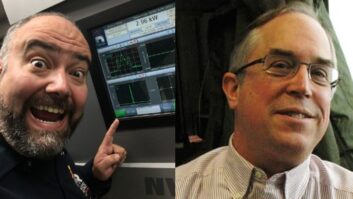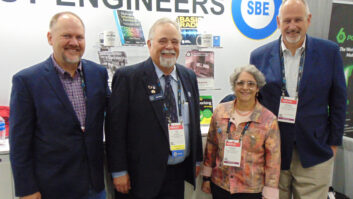A young remote broadcast tech recently asked me what it would take for him to become chief engineer one day. The simple answer I gave him was this: Learn all you can about the job and the technology of radio from the engineers working around you. Then become a “go-to” guy for getting things done to serve the technology needs of the station. Management will take notice and promote you into the CE position when it opens up.
While this is one approach that worked for me, and no doubt many others, there are many different paths to fulfilling the role of a successful CE. Every chief working in the business will have a unique and sometimes unusual story of how they advanced into the job. Most will tell you they had a knack for things technical and got involved with computers, electronic gadgets, ham radio or music and sound recording while in school.
Elmer and OJT
Most chiefs will acknowledge they had an “Elmer” or a mentor as they learned and perfected their skill sets while coming up the ranks. Often it was the CE they eventually replaced or another engineer who took the time to help and tutor them along the way. Many started out in a small market and moved up to larger markets, pursuing better pay and more fulfilling opportunities.

A continuing education student learns about transformers. Understanding the fundamentals of technology is a key part of your career development. iStockphoto/Lisa F. Young Learning by doing with on-the-job training and help from others certainly is a core component of acquiring the skills needed to execute competent radio engineering support. But it should not be the only resource on which an aspiring CE should rely to be fully engaged and prepared for dealing with ever-changing technology.
Installing, optimizing and properly troubleshooting the electronic equipment used in broadcasting requires a solid understanding of Ohm’s Law, circuit design fundamentals, computer systems and networking skills. That knowledge can be acquired in various ways.
The learning never stops
Formal courses in these disciplines at a community college, tech school or in the military, or via the Internet and correspondence, is certainly one of the best ways. Those with a BSEE or ASEE degree or MCSE certification have a distinct advantage in our profession. At a minimum, completing a course of study through to a degree recognizes commitment and perseverance, both valued traits.
Everyone learns at different rates, using different resources and methods with varying degrees of efficiency. Some of the smartest engineers I’ve met in this business have no engineering degree or formal training. Along with OJT, they were able to learn and master the underlying theory and fundamentals through their own study.
Unless you spend the effort acquiring this basic knowledge, you will be forever handicapped in trying to become a truly qualified and effective CE. You may be able to hook up gear, do complicated remotes and work wonders on a PC, but unless you can use test equipment to evaluate operating parameters, signal flow and waveforms, it’s almost impossible to troubleshoot and repair failed hardware properly.
Understanding how any piece of equipment works on the inside and being able to fix it gives you a much better ability to pick and choose new equipment as the need arises.
Beyond repairs
In the days before consolidation, personal computers and the Internet, the chief engineer was charged primarily with keeping the transmitter and studios running smoothly. The job has evolved over the years, and it now demands additional talents beyond fixing things. Good administrative and people skills have become vital prerequisites for a well-versed and effective CE.
Most station managers want their chief engineer to be a fully engaged department head. Working with spreadsheets, vendors and business departments, along with serving the needs of program directors and talent, requires lots of human interaction. A good “bedside manner” is probably just as important to the GM as the ability to coax a piece of malfunctioning equipment into acceptable behavior.
Some companies have found it preferable to appoint an operations manager to oversee their station’s technical needs without a CE. In many smaller stations and markets, the GM serves that role by default. Equipment repairs and transmitter plant maintenance are outsourced to contractors. A corporate engineer or financial officer makes all the equipment replacement and construction project decisions. This model tends to be employed where finding a suitable and affordable local market chief engineer is more difficult.
The work is never done
Competitive and successful stations typically expect their chief engineer to be the point person for all things technical that affect their ability to compete and succeed. Keeping the stations sounding good and always on the air is, to be sure, still job #1, but there are a myriad of other challenges today’s CE is charged with, as shown on the accompanying list. You no doubt can add more.
What Does the CE Do? Keeping the station sounding good and on the air is a chief engineer’s first task. Here are some others.
- FCC technical rules compliance
- Technical department purchasing, planning and budgeting
- Studio equipment maintenance and updating
- Transmission systems and transmitter plant maintenance and updating
- HD Radio transmission systems installation, maintenance and updating
- Digital storage and automation system maintenance and updating
- Web streaming systems maintenance and updating
- RBDS and HD-R text scrolling systems maintenance and updating
- EAS systems logging compliance and equipment maintenance
- Arbitron PPM encoding and monitor systems installation and maintenance
- Satellite downlink systems installation, maintenance and updating
- Personal computers, servers, printers and LAN systems maintenance and updating
- Software platforms installation, maintenance and updating
- Telephone and voicemail systems maintenance and updating
- Remote broadcast systems maintenance and updating
- Promotion vans and station-owned vehicle maintenance
- Training and helping operations staff with equipment and computer issues of all kinds
- Building and physical plant HVAC, electrical and plumbing systems repair and maintenance
- Anything else of a systems or hardware nature not listed here, which no one else is able to deal with or resolve
What else? Tell us at [email protected].Certainly the CE is able to delegate a fair amount of the actual hands-on effort to others in his department and to contractors to keep everything listed here under control and running smoothly. But it’s almost always up to the CE to deal with all significant issues and crises first to determine if they can be resolved without engaging additional help or outside resources. The work days (and nights) can often be very long. Balancing work with personal and family time is another challenge all by itself.
The right stuff
If you ask GMs to identify the qualifications they are looking for, the foremost prerequisite is demonstrated technical competence dealing with radio station systems, hardware and infrastructure, with a successful track record of experience doing the job elsewhere. After that, personal traits such as honesty, integrity, reliability, good people skills and communication skills are important. Also desirable are good administrative skills with the ability to stay organized and prioritize tasks.
We could add more qualifications, but anything else is really less important. Degrees and certifications, including SBE, are always desirable and would be tiebreakers where several qualified candidates for a given opening are being considered.
GMs will almost always look for positive and supportive recommendations from other managers they know and trust in the industry before hiring a new CE. Be very careful how you forge your reputation. If it ever becomes tarnished for whatever reason, fixing it will be difficult.
The Great Meltdown of last year witnessed staff reductions everywhere, and engineers were not spared. Managers whittled down the ranks of radio engineers to those who are the most capable and willing to handle an increased workload. As a result, there are a lot of qualified folks still on the beach. Many would like to find an opportunity to get back into the business.
That means supply and demand is forcing down salaries and benefits. If you are looking for a CE opening, be prepared to temper your expectations. Most important, realize that stations with openings will have multiple applicants, and can pick the best fit for their situation. Since the finalists will all be technically skilled and competent, the choice will no doubt be decided by how well the winner scores on the other qualifications deemed most valuable by the hiring manager.
Chiefly advice
For the aspiring staff engineers and remote techs looking to move up, I offer the following:
If you haven’t already done so, find and commit to a program best suited to your hours and personal situation that will enhance your technical education. There are good electronic and computer technology two-year programs at many community colleges. And there are various tech schools around the country that offer more focused programs. Very few offer specific curricula for broadcast engineering, but there are communications systems technology tracks used by telephone, cellular and cable companies for training their techs.
As you go about your present job duties, ask lots of questions and pay close attention to how the senior engineers do their jobs. Be a self-starter. Don’t just wait for a supervisor to tell you something needs to be done. Look for things to do and folks to help. Offer to help the chief when he needs extra hands for transmitter site visits. Be trustworthy and reliable.
The current crop of CEs is aging, retiring, moving to other industries or being laid off somewhere almost every day. We’ve heard this question asked by many for a long time: Where is the next generation of CEs coming from? The telecom, cable, computer and Internet industries have seduced much of the potential talent that may have pursued careers in radio in earlier days.
Our business really is just as exciting and challenging as it was 20 or 30 years ago. Every day offers a different set of problems to solve and obstacles to negotiate, whether they be hardware, software or peopleware. Changes in business practices and technology innovations have merely added to the list of challenges. There are still young, aspiring techs who have fallen in love with radio. If they are given the proper mentoring, incentives and encouragement, they will become our chief engineers of the future.
Guy Wire is the pseudonym for a veteran radio broadcast engineer.












